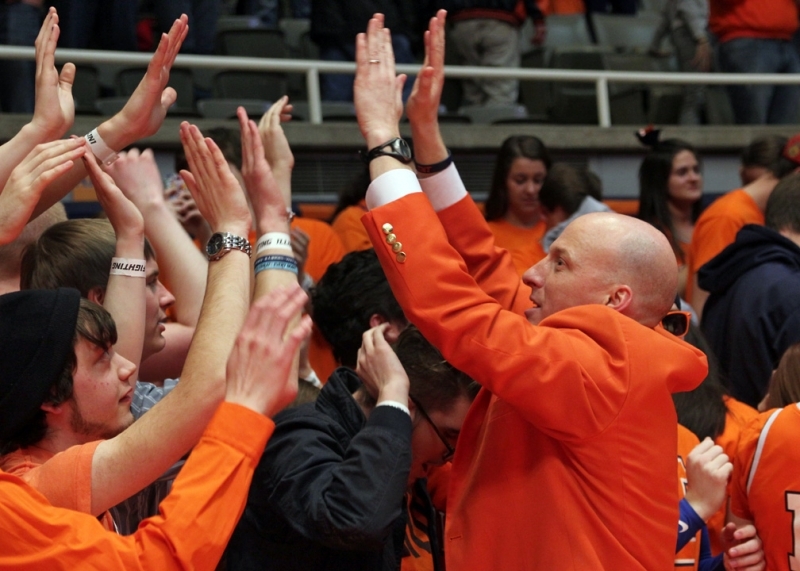Fans and media tend to lump college coaches into two camps: great coaches and great recruiters. Great coaches are the guys who get praised for the “xs and os,” for drawing up good plays and winning with whatever guys they have available. Great recruiters get the big names to come to town and let the rest work itself out.
At Illinois, Bruce Weber was a great coach and an awful recruiter. He took Bill Self’s recruits to the national championship game and then failed to capitalize on that success by luring recruits to Champaign. Self’s tenure with the Illini was too short to judge, but in general he’s considered an excellent recruiter and a decent coach (although most Illinois fans would gladly call him an amazing coach if his one national title had come while he was here).
There are coaches who are both great recruiters and great coaches, as borne out by their record, but they are the exception — Mike Krzyzewski, Roy Williams, etc. — and employed by the blue bloods.
This is all important in the reckoning of what John Groce is, exactly. Which is underscored by Illinois’s recent play, capped by its worst loss in 25 years, a 103-69 loss at Indiana on Tuesday night.
We have to start to answer this question by looking back at 2012, Groce’s first year with the Illini. He inherited a roster from Weber with some moderate talent (e.g., seniors Brandon Paul, DJ Williams, Tyler Griffey) and some promising youth (e.g., Tracy Abrams, Nnanna Egwu), but a middling record overall and a poor conference record (17-15, 6-12).
Groce took the team in his first year and rattled off 12 straight wins, claiming a spot as high as #10 in the national polls, before coming back to earth. Big Ten season started rough, with a 2-7 opening, then turned around with a big upset over #1 Indiana. A 21-11 record got Illinois an NCAA Tourney berth and the team very nearly made the Sweet 16, with their exit from the tournament even prompting a rule change from the NCAA.
At this point, no one was questioning Groce’s coaching skills. He took someone else’s guys, players who had been very mediocre the year before, and made winners of them. Here’s what was said back then:
“This season was different. We had John Groce…Illinois’ yearly pattern of failure was broken on a shot by a much-maligned senior, set up by the heart of two other maligned seniors, changing the course of the season, of John Groce’s first year, and potentially of the future of Illini basketball.”
Dave Wischnosky, then of CBS Chicago, writing after the Indiana win:
“If Illinois can parlay a thrilling upset of the nation’s top-ranked team into a madcap run to a tourney bid, that wouldn’t just be simple success for Groce & Co. That would be a statement.”
After that 23-13 season, Groce’s teams went 20-15 and 19-14, missing the tournament the last two years. More notable, perhaps, are the near-misses Groce has had on many, many highly regarded recruits. Illinois came in second on top guys like Cliff Alexander and Jalen Brunson, were mentioned in the final lists of Carlton Bragg, Jawun Evans, and Elijah Thomas, and even got lip service from Jahlil Okafor, the number one recruit in his class.

Which brings us to the present. Illinois (9-10, 1-5) have been dealt an injury hand that would cripple any program. It’s hard to imagine Self or Coach K salvaging much of the season with the roster of healthy players Groce has had to deal with. But looking at this latest loss, a truly miserable one to Indiana, everyone’s tone has harshened.
“This team lacks any type of a structured, adjustable offensive system, and that’s piled on top of a defense that looks lost.”
So, what is John Groce as a coach? A good coach, a bad recruiter, the opposite, all of the above?
Whenever Illinois gets a new athletic director, this is probably going to be one of the most pressing issues they deal with. With the renovation of the State Farm Center complete next year, maximizing the value of that investment will be paramount for the Department of Intercollegiate Athletics. That means the product on the floor has to be good, otherwise people aren’t spending the money — especially the jacked-up rates they’re asking now–to watch this level of basketball.
I don’t envy whoever gets that job (although their paycheck will certainly make that tough decision a lot easier) because I don’t see an easy answer here. Groce looked like a good coach before he had his recruits here, but then he’s had decent recruiting classes (despite the high-profile misses) and shown an ability to get close to the best recruits in the nation while the quality on the floor has gone down. If you replace Groce, there’s no guarantee the quality of the product on the floor will improve, plus you run the risk of losing 2017 recruits (a class in which the state of Illinois is absolutely loaded and Groce has made multiple in-roads), as happened after the upheaval with the football team.
Likewise, history offers us no help. Lou Henson started his career at Illinois with five seasons of not making the NCAA Tournament. Then he only missed the Tourney in five of his last 17 seasons and never for three consecutive seasons, a precedent that only matters because Groce is about to break it.
And that’s where Illinois basketball is. If this were 1979 you could give Groce the benefit of doubt that Henson got. But people demand results quicker these days, and donors are and will continue to be to king at the university. So prepare yourself for more hand-wringing, more takes about whether Groce should stay or go, whether Groce is even a good coach at all, at least until Illinois basketball concludes this no good, very bad year–especially if Illinois loses like it did against Indiana again.








